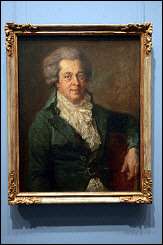July 13, 2011 report
Mozart may have lived longer if he had spent more time in the sun: study

(Medical Xpress) -- According to a new report published in Medical Problems of Performing Artists, Austrian composer Wolfgang Amadeus Mozart may have lived longer had he spent more time in the sun and allowed his body to produce more vitamin D.
Mozart died in 1791 at the age of 35, and since his passing, many researchers have speculated as what caused his early death. He was buried three days after his death and no autopsy was ever performed. Previous literature had noted chronic kidney disease, strep throat and pink eye as a few conditions he battled toward the end of his life. Between 1762 and 1783, Mozart suffered numerous infections, all of which seemed to occur between mid-October and mid-May.
It was this information that sparked William Grant, a retired NASA atmospheric physicist, and Dr. Stefan Pilz to believe that maybe there was an underlying reason for Mozart’s frequent infection. Their new hypothesis suggests that Mozart was vitamin D deficient.
Vitamin D is a nutrient that is essential for bone health. It could be found back then in oily fish such as salmon. However, it is known as the sunshine vitamin because the body is able to produce the nutrient when the skin is exposed to the ultraviolet B rays from the sun.
Mozart, who lived in a high-latitude home in Austria, lacked exposure to the sun as the area does not provide the opportunity for sufficient exposure for six months out of the year, or the winter months. He was also known to work during the night and sleep during the day so his sun exposure was minimal.
In recent years, vitamin D deficiency has been linked to many different medical conditions and greater risks for influenza, pneumonia, certain cancers, autoimmune diseases, cardiovascular disease, musculoskeletal pain and more. Given that Mozart’s infections seemed to occur at the same time when sun exposure and his vitamin D level would have been at its lowest, it could definitely provide an explanation.
With vitamin D deficiency becoming a widespread health concern today, researchers are hoping this research may act as a wakeup call for other musicians who spend most of their time indoors and do not receive sun exposure. The researchers pointed to British cellist Jacqueline Mary du Pre who passed away at age 42 from multiple sclerosis, a disease linked to vitamin D deficiency.
The recommendations for vitamin D supplementation are a daily intake of 600 IU, however many researchers believe that 4,000 IU is more accurate and recommended. While there is no way to prove or disprove the vitamin D deficiency theory in relation to Mozart’s death, it does raise the question if he had had a little more sun, could he have lived a few more years?
More information: Vitamin D deficiency contributed to Mozart's death, William B. Grant, Stefan Pilz, Medical Problems of Performing Artists: Volume 26 Number 2: Page 117 (June 2011)
Abstract
Dawson's recent extensive bibliographic review of the cause of death of Wolfgang Amadeus Mozart found that there were a number of hypotheses including poisoning, infection, cardiovascular disease, and renal disease and its complications. Overlooked in any of the papers hypothesizing about his death was a discussion of the likely role of very low serum 25-hydroxyvitamin D [25(OH)D] level in contributing to his untimely death.
© 2010 PhysOrg.com















